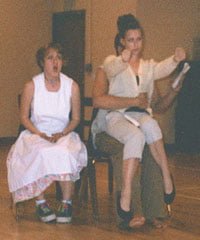This semester, a cast of five first-year students is tackling a play riddled with some of our society’s biggest taboos. 1998 Pulitzer Prize recipient How I Learned to Drive by Paula Vogel, takes an intimate look at incest, pedophilia, and sexual identity.
I had the opportunity to sit in on a run-through of the play last week, despite the fact that the company was only in their third week of rehearsal.
I found myself too engrossed to take notes, too entertained to control my laughter, and too moved to hang around and do interviews.
“Theatre Studies strives to produce work that addresses significant social issues while simultaneously entertaining the public,” said director Lee Soroko.
How I Learned to Drive undoubtedly accomplishes those goals.
Bronson Stephens, who plays a child molester named Peck, feels that the issues addressed in How I Learned to Drive are particularly relevant at Guilford.
“(This show) is important because it deals with stuff that people don’t like to talk about,” said Stephens. “I see that as a theme on Guilford’s campus – we aren’t afraid to discuss things that other people won’t.”
Samantha Kittle plays the lead role of a sexually abused young woman called Lil Bit, and like Stephens, she recognizes the importance of the play’s subject matter and admires the way in which it is presented.
“It’s a look at sexual abuse but in a way that is very real,” said Kittle. “It’s not a constant negative look at abuse. It’s a different take on it. My character is very triumphant.”
Despite the mature nature of the play’s subject matter, Soroko has no reservations about the abilities of the first-year cast members to meet the show’s demands.
“These five freshmen (Samantha Kittle, Bronson Stephens, Vita Generalova, Sasha Spoerri, and Trina Farmer) are open, energetic, and willing to be vulnerable,” said Soroko. “They were the best people who auditioned.”
This is not to say that the roles these actors have taken on are anything less than challenging.
One of the most difficult things about playing Lil Bit is that “I play a lot of ages, from 11 to 35,” said Kittle. “I also have to address the audience and then go back to addressing the other characters, which is hard to balance.”
Kittle is not the only actor who will have to over come the technical demands of the play. All the cast members will have to have to make adjustments once the set is completed and rehearsals move in to Sternburger auditorium.
“The stage is raked (built on an incline), so the actors will have to get used to that,” said set and costume designer, April Soroko. “It will be like walking up a small hill.”
The biggest challenges, however; are the emotional, rather than technical, demands of the play.
“When we do the play all the way through it takes an emotional toll on you,” Kittle said. “One night, when I came in from a run-through, I had to just sit and collect myself for about five minutes before I could go out.”
Although the play is taxing for the actors in many ways, it is also rewarding.
Stephens said, “It’s a good way to experience something that you will never really experience. Acting is an outlet where you can be the bad guy with no repercussions.”
This play is also intended to be an outlet for those in our community who have been sexually abused.
“Given the sensitive nature of the issues involved, there will be a panel discussion with members of the community from the rape crisis center, child-abuse shelter, women’s shelter, and sexual abuse shelter on Nov. 21,” said Soroko. “There will also be an audience member on hand each night who is trained and licensed in case someone needs to talk.”
How I Learned To Drive will be performed Nov. 15 through 16 and 21 through 23 at 8:00 PM in Sternberger Auditorium. Student tickets will be $1.

